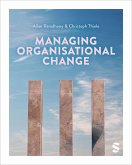The SAGE Handbook of Organizational Institutionalism (eBook, PDF)
Redaktion: Greenwood, Royston; Meyer, Renate E.; Lawrence, Thomas B.; Oliver, Christine
50,95 €
50,95 €
inkl. MwSt.
Sofort per Download lieferbar

25 °P sammeln
50,95 €
Als Download kaufen

50,95 €
inkl. MwSt.
Sofort per Download lieferbar

25 °P sammeln
Jetzt verschenken
Alle Infos zum eBook verschenken
50,95 €
inkl. MwSt.
Sofort per Download lieferbar
Alle Infos zum eBook verschenken

25 °P sammeln
The SAGE Handbook of Organizational Institutionalism (eBook, PDF)
Redaktion: Greenwood, Royston; Meyer, Renate E.; Lawrence, Thomas B.; Oliver, Christine
- Format: PDF
- Merkliste
- Auf die Merkliste
- Bewerten Bewerten
- Teilen
- Produkt teilen
- Produkterinnerung
- Produkterinnerung

Bitte loggen Sie sich zunächst in Ihr Kundenkonto ein oder registrieren Sie sich bei
bücher.de, um das eBook-Abo tolino select nutzen zu können.
Hier können Sie sich einloggen
Hier können Sie sich einloggen
Sie sind bereits eingeloggt. Klicken Sie auf 2. tolino select Abo, um fortzufahren.

Bitte loggen Sie sich zunächst in Ihr Kundenkonto ein oder registrieren Sie sich bei bücher.de, um das eBook-Abo tolino select nutzen zu können.
The SAGE Handbook of Organizational Institutionalism brings together extensive coverage of aspects of Institutional Theory and an array of top academic contributors.
Now in its Second Edition , the book has been thoroughly revised and reorganised, with all chapters updated to maintain a mix of theory, how to conduct institutional organizational analysis, and contemporary empirical work. New chapters on Translation , Networks and Institutional Pluralism are included to reflect new directions in the field.
The Second Edition has also been reorganized into six parts:
Part One:…mehr
- Geräte: PC
- mit Kopierschutz
- eBook Hilfe
- Größe: 23.84MB
Andere Kunden interessierten sich auch für
![The SAGE Handbook of Family Business (eBook, PDF) The SAGE Handbook of Family Business (eBook, PDF)]() The SAGE Handbook of Family Business (eBook, PDF)96,95 €
The SAGE Handbook of Family Business (eBook, PDF)96,95 €![The SAGE Handbook of Organizational Behavior (eBook, PDF) The SAGE Handbook of Organizational Behavior (eBook, PDF)]() The SAGE Handbook of Organizational Behavior (eBook, PDF)96,95 €
The SAGE Handbook of Organizational Behavior (eBook, PDF)96,95 €![The SAGE Handbook of Organizational Institutionalism (eBook, ePUB) The SAGE Handbook of Organizational Institutionalism (eBook, ePUB)]() The SAGE Handbook of Organizational Institutionalism (eBook, ePUB)50,95 €
The SAGE Handbook of Organizational Institutionalism (eBook, ePUB)50,95 €![Managing Organisational Change (eBook, PDF) Managing Organisational Change (eBook, PDF)]() Allan RamdhonyManaging Organisational Change (eBook, PDF)46,95 €
Allan RamdhonyManaging Organisational Change (eBook, PDF)46,95 €![Managing Change in Organizations (eBook, PDF) Managing Change in Organizations (eBook, PDF)]() Stefan SvenningsonManaging Change in Organizations (eBook, PDF)44,95 €
Stefan SvenningsonManaging Change in Organizations (eBook, PDF)44,95 €![The SAGE Handbook of Organizational Discourse (eBook, PDF) The SAGE Handbook of Organizational Discourse (eBook, PDF)]() The SAGE Handbook of Organizational Discourse (eBook, PDF)96,95 €
The SAGE Handbook of Organizational Discourse (eBook, PDF)96,95 €![The SAGE Handbook of New Approaches in Management and Organization (eBook, PDF) The SAGE Handbook of New Approaches in Management and Organization (eBook, PDF)]() The SAGE Handbook of New Approaches in Management and Organization (eBook, PDF)96,95 €
The SAGE Handbook of New Approaches in Management and Organization (eBook, PDF)96,95 €-
-
-
The SAGE Handbook of Organizational Institutionalism brings together extensive coverage of aspects of Institutional Theory and an array of top academic contributors.
Now in its Second Edition, the book has been thoroughly revised and reorganised, with all chapters updated to maintain a mix of theory, how to conduct institutional organizational analysis, and contemporary empirical work. New chapters on Translation, Networks and Institutional Pluralism are included to reflect new directions in the field.
The Second Edition has also been reorganized into six parts:
Now in its Second Edition, the book has been thoroughly revised and reorganised, with all chapters updated to maintain a mix of theory, how to conduct institutional organizational analysis, and contemporary empirical work. New chapters on Translation, Networks and Institutional Pluralism are included to reflect new directions in the field.
The Second Edition has also been reorganized into six parts:
- Part One: Beginnings (Foundations)
- Part Two: Organizations and their Contexts
- Part Three: Institutional Processes
- Part Four: Conversations
- Part Five: Consequences
- Part Six: Reflections
Dieser Download kann aus rechtlichen Gründen nur mit Rechnungsadresse in A, D ausgeliefert werden.
Produktdetails
- Produktdetails
- Verlag: SAGE Publications
- Seitenzahl: 928
- Erscheinungstermin: 1. Mai 2017
- Englisch
- ISBN-13: 9781526415059
- Artikelnr.: 48412568
- Verlag: SAGE Publications
- Seitenzahl: 928
- Erscheinungstermin: 1. Mai 2017
- Englisch
- ISBN-13: 9781526415059
- Artikelnr.: 48412568
- Herstellerkennzeichnung Die Herstellerinformationen sind derzeit nicht verfügbar.
Royston Greenwood is the Telus Professor of Strategic Management in the School of Business, University of Alberta, Visiting Professorial Fellow at the University of Edinburgh, and Visiting Professor at the University of Cambridge. He is a Fellow of the Academy of Management and a former Chair of the Academy's Organization and Management Theory (OMT) Division. In 2013 the European Group for Organization Studies made him an Honorary Member and in 2014 he was the Distinguished Scholar of the Academy of Management OMT Division. His research focuses upon institutional and organizational change and a favored empirical context is that of professional service firms. Recently he has turned to understanding the institutional foundations of corporate fraud. He serves or has recently served on the editorial and/or advisory boards of several leading journals, including the Academy of Management Journal, Organization Science, Organization Studies, the Journal of Management Studies, the Academy of Management Discoveries and the Academy of Management Annals, of which he is a former editor. Christine Oliver is the Henry J. Knowles Chair of Organizational Strategy in the Schulich School of Business at York University, Toronto, Canada. Christine is interested in institutional processes and research questions that address the interface between strategy and poverty. Christine′s work has appeared in Administrative Science Quarterly, Academy of Management Review, Organization Studies, Academy of Management Journal, Journal of Management Studies, Strategic Management Journal, American Sociological Review, and other outlets. She won the award for Best Paper in Academy of Management Review in 1991 and in the Canadian Journal of Administrative Science in 1993. She is past Division Chair of the Academy's Organization and Management Theory Division and past Representative-At-Large on the Academy of Management Board of Governors. Christine is past Associate Editor (1993-1996) and Editor (1996-2003) of the Administrative Science Quarterly. She won the Organization and Management Theory Distinguished Scholar Award in 2009. In 2013 she was elected to the Fellows of the Academy of Management in Recognition of Distinguished and Scholarly Contributions to the Profession of Management. Thomas B. Lawrence is a Professor of Strategy at the Saïd Business School, University of Oxford. He received his PhD in organizational analysis from the University of Alberta. His research focuses on the dynamics of agency, power, and institutions in organizations and organizational fields. It has appeared in such journals as Administrative Science Quarterly, Academy of Management Journal, Academy of Management Review, Harvard Business Review, Sloan Management Review, Organization Studies, Journal of Management Studies, Human Relations, and the Journal of Management. He is a co-editor of the Sage Handbook of Organization Studies, Second Edition, and Institutional Work: Actors and Agency in Institutional Studies of Organizations.
Introduction - Royston Greenwood, Christine Oliver, Thomas B. Lawrence and Renate E. Meyer
SECTION 1: BEGINNINGS (FOUNDATIONS)
Chapter 1: Organizational Legitimacy: Six Key Questions - David L. Deephouse, Jonathan Bundy, Leigh Plunkett Tost & Mark C. Suchman
Chapter 2: Organizational Fields: Past, Present and Future - Melissa Wooten and Andrew J. Hoffman
SECTION 2: ORGANIZATIONS AND THEIR CONTEXTS
Chapter 3: Isomorphism, Diffusion and Decoupling - Eva Boxenbaum and Stefan Jonsson
Chapter 4: The imitation and translation of management ideas - Linda Wedlin and Kerstin Sahlin
Chapter 5: On Hybrids and Hybrid Organizing: A Review and Roadmap for Future Research - Julie Battilana, Marya Besharov and Bjoern Mitzinneck
Chapter 6: Fields, Institutional Infrastructure and Governance - C.R. (Bob) Hinings, Danielle Logue and Charlene Zietsma
Chapter 7: Drivers of Community Strength: An Institutional Logics Perspective on Geographical and Affiliation Based Communities - Juan Almandoz, Chris Marquis and Michael Cheely
Chapter 8: The Consequences of Globalization for Institutions and Organizations - Markus A. Höllerer, Peter Walgenbach and Gili S. Drori
Chapter 9: Theorizing the Identity- Institution Relationship: Considering identity as antecedent to, consequence of, and Mechanism for, processes of institutional change - Mary Ann Glynn
SECTION 3: INSTITUTIONAL PROCESSES
Chapter 10: Institutional Entrepreneurship and Change in Fields - Cynthia Hardy and Steve Maguire
Chapter 11: Social Movements and the Dynamics of Institutions and Organizations - Marc Schneiberg and Michael Lounsbury
Chapter 12: Opening the Black Box: The Microfoundations of Institutions - Walter W. Powell and Claus Rerup
Chapter 13: Coalface Institutionalism - Stephen R. Barley
Chapter 14: Towards a Practice-Driven Institutionalism - Michael Smets, Angela Aristidou and Richard Whittington
Chapter 15: Language, Cognition and Institutions: Studying Institutionalization Using Linguistic Methods - Nelson Phillips and Namrata Malhotra
Chapter 16: The Evolving Role of Meaning in Theorizing Institutions - Tammar B. Zilber
Chapter 17: Networks and Institutions - Walter W. Powell and Achim Oberg
Chapter 18: Power, Institutions, and Organizations - Thomas B. Lawrence and Sean Buchanan
SECTION 4: CONVERSATIONS
Chapter 19: The Institutional Logics Perspective - William Ocasio, Patricia H. Thornton and Michael Lounsbury
Chapter 20: Institutional Pluralism Revisited - Matthew S. Kraatz and Emily S. Block
Chapter 21: Institutional Work: Taking Stock and Making It Matter - Christian E. Hampel, Thomas B. Lawrence and Paul Tracey
Chapter 22: Living institutions: Bringing emotions into organizational institutionalism - Jaco Lok, W.E. Douglas Creed, Rich DeJordy and Maxim Voronov
Chapter 23: The Material and Visual Basis of institutions - Candace Jones, Renate E. Meyer, Dennis Jancsary and Markus A. Höllerer
Chapter 24: Advancing Category Research: Theoretical Mapping and Under-researched Areas - Rodolphe Durand and Romain Boulongne
SECTION 5: CONSEQUENCES
Chapter 25: Institutional Theory and Entrepreneurship: Taking Stock and Moving Forward - Robert J. David, Wesley D. Sine and Caroline Kaehr Serra
Chapter 26: Organizations, institutions, and inequality - Gerald F. Davis
Chapter 27: Institutions and Economic Inequality - John Amis, Kamal Munir and Johanna Mair
Chapter 28: Institutions, Institutional Theory, and Organizational Wrongdoing - Donald Palmer
Chapter 29: Institutional Theory and the Natural Environment: Building Research through Tensions and Paradoxes - P. Devereaux Jennings and Andrew J. Hoffman
Chapter 30: Race and Institutionalism - Fabio Rojas
Chapter 31: Are Diversity Programs Merely Ceremonial? Evidence-Free Institutionalization - Frank Dobbin and Alexandra Kalev
SECTION 6: REFLECTIONS
Chapter 32: Reflections on Institutional Theories of Organizations - John W. Meyer
Chapter 33: Institutional Theory: Onward and Upward - W. Richard Scott
SECTION 1: BEGINNINGS (FOUNDATIONS)
Chapter 1: Organizational Legitimacy: Six Key Questions - David L. Deephouse, Jonathan Bundy, Leigh Plunkett Tost & Mark C. Suchman
Chapter 2: Organizational Fields: Past, Present and Future - Melissa Wooten and Andrew J. Hoffman
SECTION 2: ORGANIZATIONS AND THEIR CONTEXTS
Chapter 3: Isomorphism, Diffusion and Decoupling - Eva Boxenbaum and Stefan Jonsson
Chapter 4: The imitation and translation of management ideas - Linda Wedlin and Kerstin Sahlin
Chapter 5: On Hybrids and Hybrid Organizing: A Review and Roadmap for Future Research - Julie Battilana, Marya Besharov and Bjoern Mitzinneck
Chapter 6: Fields, Institutional Infrastructure and Governance - C.R. (Bob) Hinings, Danielle Logue and Charlene Zietsma
Chapter 7: Drivers of Community Strength: An Institutional Logics Perspective on Geographical and Affiliation Based Communities - Juan Almandoz, Chris Marquis and Michael Cheely
Chapter 8: The Consequences of Globalization for Institutions and Organizations - Markus A. Höllerer, Peter Walgenbach and Gili S. Drori
Chapter 9: Theorizing the Identity- Institution Relationship: Considering identity as antecedent to, consequence of, and Mechanism for, processes of institutional change - Mary Ann Glynn
SECTION 3: INSTITUTIONAL PROCESSES
Chapter 10: Institutional Entrepreneurship and Change in Fields - Cynthia Hardy and Steve Maguire
Chapter 11: Social Movements and the Dynamics of Institutions and Organizations - Marc Schneiberg and Michael Lounsbury
Chapter 12: Opening the Black Box: The Microfoundations of Institutions - Walter W. Powell and Claus Rerup
Chapter 13: Coalface Institutionalism - Stephen R. Barley
Chapter 14: Towards a Practice-Driven Institutionalism - Michael Smets, Angela Aristidou and Richard Whittington
Chapter 15: Language, Cognition and Institutions: Studying Institutionalization Using Linguistic Methods - Nelson Phillips and Namrata Malhotra
Chapter 16: The Evolving Role of Meaning in Theorizing Institutions - Tammar B. Zilber
Chapter 17: Networks and Institutions - Walter W. Powell and Achim Oberg
Chapter 18: Power, Institutions, and Organizations - Thomas B. Lawrence and Sean Buchanan
SECTION 4: CONVERSATIONS
Chapter 19: The Institutional Logics Perspective - William Ocasio, Patricia H. Thornton and Michael Lounsbury
Chapter 20: Institutional Pluralism Revisited - Matthew S. Kraatz and Emily S. Block
Chapter 21: Institutional Work: Taking Stock and Making It Matter - Christian E. Hampel, Thomas B. Lawrence and Paul Tracey
Chapter 22: Living institutions: Bringing emotions into organizational institutionalism - Jaco Lok, W.E. Douglas Creed, Rich DeJordy and Maxim Voronov
Chapter 23: The Material and Visual Basis of institutions - Candace Jones, Renate E. Meyer, Dennis Jancsary and Markus A. Höllerer
Chapter 24: Advancing Category Research: Theoretical Mapping and Under-researched Areas - Rodolphe Durand and Romain Boulongne
SECTION 5: CONSEQUENCES
Chapter 25: Institutional Theory and Entrepreneurship: Taking Stock and Moving Forward - Robert J. David, Wesley D. Sine and Caroline Kaehr Serra
Chapter 26: Organizations, institutions, and inequality - Gerald F. Davis
Chapter 27: Institutions and Economic Inequality - John Amis, Kamal Munir and Johanna Mair
Chapter 28: Institutions, Institutional Theory, and Organizational Wrongdoing - Donald Palmer
Chapter 29: Institutional Theory and the Natural Environment: Building Research through Tensions and Paradoxes - P. Devereaux Jennings and Andrew J. Hoffman
Chapter 30: Race and Institutionalism - Fabio Rojas
Chapter 31: Are Diversity Programs Merely Ceremonial? Evidence-Free Institutionalization - Frank Dobbin and Alexandra Kalev
SECTION 6: REFLECTIONS
Chapter 32: Reflections on Institutional Theories of Organizations - John W. Meyer
Chapter 33: Institutional Theory: Onward and Upward - W. Richard Scott
Introduction - Royston Greenwood, Christine Oliver, Thomas B. Lawrence and Renate E. Meyer
SECTION 1: BEGINNINGS (FOUNDATIONS)
Chapter 1: Organizational Legitimacy: Six Key Questions - David L. Deephouse, Jonathan Bundy, Leigh Plunkett Tost & Mark C. Suchman
Chapter 2: Organizational Fields: Past, Present and Future - Melissa Wooten and Andrew J. Hoffman
SECTION 2: ORGANIZATIONS AND THEIR CONTEXTS
Chapter 3: Isomorphism, Diffusion and Decoupling - Eva Boxenbaum and Stefan Jonsson
Chapter 4: The imitation and translation of management ideas - Linda Wedlin and Kerstin Sahlin
Chapter 5: On Hybrids and Hybrid Organizing: A Review and Roadmap for Future Research - Julie Battilana, Marya Besharov and Bjoern Mitzinneck
Chapter 6: Fields, Institutional Infrastructure and Governance - C.R. (Bob) Hinings, Danielle Logue and Charlene Zietsma
Chapter 7: Drivers of Community Strength: An Institutional Logics Perspective on Geographical and Affiliation Based Communities - Juan Almandoz, Chris Marquis and Michael Cheely
Chapter 8: The Consequences of Globalization for Institutions and Organizations - Markus A. Höllerer, Peter Walgenbach and Gili S. Drori
Chapter 9: Theorizing the Identity- Institution Relationship: Considering identity as antecedent to, consequence of, and Mechanism for, processes of institutional change - Mary Ann Glynn
SECTION 3: INSTITUTIONAL PROCESSES
Chapter 10: Institutional Entrepreneurship and Change in Fields - Cynthia Hardy and Steve Maguire
Chapter 11: Social Movements and the Dynamics of Institutions and Organizations - Marc Schneiberg and Michael Lounsbury
Chapter 12: Opening the Black Box: The Microfoundations of Institutions - Walter W. Powell and Claus Rerup
Chapter 13: Coalface Institutionalism - Stephen R. Barley
Chapter 14: Towards a Practice-Driven Institutionalism - Michael Smets, Angela Aristidou and Richard Whittington
Chapter 15: Language, Cognition and Institutions: Studying Institutionalization Using Linguistic Methods - Nelson Phillips and Namrata Malhotra
Chapter 16: The Evolving Role of Meaning in Theorizing Institutions - Tammar B. Zilber
Chapter 17: Networks and Institutions - Walter W. Powell and Achim Oberg
Chapter 18: Power, Institutions, and Organizations - Thomas B. Lawrence and Sean Buchanan
SECTION 4: CONVERSATIONS
Chapter 19: The Institutional Logics Perspective - William Ocasio, Patricia H. Thornton and Michael Lounsbury
Chapter 20: Institutional Pluralism Revisited - Matthew S. Kraatz and Emily S. Block
Chapter 21: Institutional Work: Taking Stock and Making It Matter - Christian E. Hampel, Thomas B. Lawrence and Paul Tracey
Chapter 22: Living institutions: Bringing emotions into organizational institutionalism - Jaco Lok, W.E. Douglas Creed, Rich DeJordy and Maxim Voronov
Chapter 23: The Material and Visual Basis of institutions - Candace Jones, Renate E. Meyer, Dennis Jancsary and Markus A. Höllerer
Chapter 24: Advancing Category Research: Theoretical Mapping and Under-researched Areas - Rodolphe Durand and Romain Boulongne
SECTION 5: CONSEQUENCES
Chapter 25: Institutional Theory and Entrepreneurship: Taking Stock and Moving Forward - Robert J. David, Wesley D. Sine and Caroline Kaehr Serra
Chapter 26: Organizations, institutions, and inequality - Gerald F. Davis
Chapter 27: Institutions and Economic Inequality - John Amis, Kamal Munir and Johanna Mair
Chapter 28: Institutions, Institutional Theory, and Organizational Wrongdoing - Donald Palmer
Chapter 29: Institutional Theory and the Natural Environment: Building Research through Tensions and Paradoxes - P. Devereaux Jennings and Andrew J. Hoffman
Chapter 30: Race and Institutionalism - Fabio Rojas
Chapter 31: Are Diversity Programs Merely Ceremonial? Evidence-Free Institutionalization - Frank Dobbin and Alexandra Kalev
SECTION 6: REFLECTIONS
Chapter 32: Reflections on Institutional Theories of Organizations - John W. Meyer
Chapter 33: Institutional Theory: Onward and Upward - W. Richard Scott
SECTION 1: BEGINNINGS (FOUNDATIONS)
Chapter 1: Organizational Legitimacy: Six Key Questions - David L. Deephouse, Jonathan Bundy, Leigh Plunkett Tost & Mark C. Suchman
Chapter 2: Organizational Fields: Past, Present and Future - Melissa Wooten and Andrew J. Hoffman
SECTION 2: ORGANIZATIONS AND THEIR CONTEXTS
Chapter 3: Isomorphism, Diffusion and Decoupling - Eva Boxenbaum and Stefan Jonsson
Chapter 4: The imitation and translation of management ideas - Linda Wedlin and Kerstin Sahlin
Chapter 5: On Hybrids and Hybrid Organizing: A Review and Roadmap for Future Research - Julie Battilana, Marya Besharov and Bjoern Mitzinneck
Chapter 6: Fields, Institutional Infrastructure and Governance - C.R. (Bob) Hinings, Danielle Logue and Charlene Zietsma
Chapter 7: Drivers of Community Strength: An Institutional Logics Perspective on Geographical and Affiliation Based Communities - Juan Almandoz, Chris Marquis and Michael Cheely
Chapter 8: The Consequences of Globalization for Institutions and Organizations - Markus A. Höllerer, Peter Walgenbach and Gili S. Drori
Chapter 9: Theorizing the Identity- Institution Relationship: Considering identity as antecedent to, consequence of, and Mechanism for, processes of institutional change - Mary Ann Glynn
SECTION 3: INSTITUTIONAL PROCESSES
Chapter 10: Institutional Entrepreneurship and Change in Fields - Cynthia Hardy and Steve Maguire
Chapter 11: Social Movements and the Dynamics of Institutions and Organizations - Marc Schneiberg and Michael Lounsbury
Chapter 12: Opening the Black Box: The Microfoundations of Institutions - Walter W. Powell and Claus Rerup
Chapter 13: Coalface Institutionalism - Stephen R. Barley
Chapter 14: Towards a Practice-Driven Institutionalism - Michael Smets, Angela Aristidou and Richard Whittington
Chapter 15: Language, Cognition and Institutions: Studying Institutionalization Using Linguistic Methods - Nelson Phillips and Namrata Malhotra
Chapter 16: The Evolving Role of Meaning in Theorizing Institutions - Tammar B. Zilber
Chapter 17: Networks and Institutions - Walter W. Powell and Achim Oberg
Chapter 18: Power, Institutions, and Organizations - Thomas B. Lawrence and Sean Buchanan
SECTION 4: CONVERSATIONS
Chapter 19: The Institutional Logics Perspective - William Ocasio, Patricia H. Thornton and Michael Lounsbury
Chapter 20: Institutional Pluralism Revisited - Matthew S. Kraatz and Emily S. Block
Chapter 21: Institutional Work: Taking Stock and Making It Matter - Christian E. Hampel, Thomas B. Lawrence and Paul Tracey
Chapter 22: Living institutions: Bringing emotions into organizational institutionalism - Jaco Lok, W.E. Douglas Creed, Rich DeJordy and Maxim Voronov
Chapter 23: The Material and Visual Basis of institutions - Candace Jones, Renate E. Meyer, Dennis Jancsary and Markus A. Höllerer
Chapter 24: Advancing Category Research: Theoretical Mapping and Under-researched Areas - Rodolphe Durand and Romain Boulongne
SECTION 5: CONSEQUENCES
Chapter 25: Institutional Theory and Entrepreneurship: Taking Stock and Moving Forward - Robert J. David, Wesley D. Sine and Caroline Kaehr Serra
Chapter 26: Organizations, institutions, and inequality - Gerald F. Davis
Chapter 27: Institutions and Economic Inequality - John Amis, Kamal Munir and Johanna Mair
Chapter 28: Institutions, Institutional Theory, and Organizational Wrongdoing - Donald Palmer
Chapter 29: Institutional Theory and the Natural Environment: Building Research through Tensions and Paradoxes - P. Devereaux Jennings and Andrew J. Hoffman
Chapter 30: Race and Institutionalism - Fabio Rojas
Chapter 31: Are Diversity Programs Merely Ceremonial? Evidence-Free Institutionalization - Frank Dobbin and Alexandra Kalev
SECTION 6: REFLECTIONS
Chapter 32: Reflections on Institutional Theories of Organizations - John W. Meyer
Chapter 33: Institutional Theory: Onward and Upward - W. Richard Scott
The first edition of the Sage Handbook of Organizational Institutionalism in 2008 signaled a reenergizing of institutional scholarship, integrating notions of multiplicity, power, agency, and practices into institutional thought. The 2017 edition builds on these developments, but also shows that the creative energy of the field continues unabated. Among important and exciting new themes addressed from an institutional perspective in this completely revised edition are emotions, materiality and visuality, categories, inequality, sustainability and race. As organizational institutionalism continues to expand its reach and relevance, this volume is clearly a must have for any serious student of organization theory.
Ann Langley 20170406
Ann Langley 20170406







